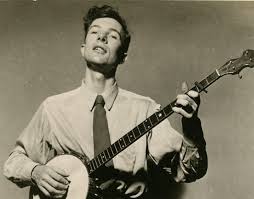Farewell, Pete Seeger
Overnight, I heard the BBC report that Peter Seeger had died, a man whose life became absorbed in the music of our nation both as a singer of traditional songs and a composer of new works. I was lucky enough to hear him sing when I was a high school kid. He was attending an environmental conference at UMass Amherst in the summer of 1971. I was on campus as a participant in the Massachusetts Boys’ State gathering, representing Dracut with my fellow Dracut High student Dan Wyman. We had been nominated by the school principal and sponsored by the local Leo C. Roth Post of the American Legion. Young guys from across the state were brought together for several days to learn about citizenship and practice politics—we elected from ourselves state senators and executive officers, including a governor. One of the counselors was Larry Dicara of Boston, who went on to a prominent political career. Two among us were chosen to attend Boys’ Nation in Washington, D.C., the same program that had brought young Bill Clinton of Arkansas to the White House and the outstretched hand of President Kennedy (the famous photograph). At the time I didn’t realize how astounding it was that the American Legion sponsors had arranged for an impromptu concert for us by Pete Seeger, the legendary musician and high profile political activist (Civil Rights, anti-Vietnam War, ecology). Pete Seeger had been black-listed for years after being smeared by extremists in the Congress and media for his socialist and communist beliefs in the 1930s. But there he was singing for the next generation of voters in Amherst. We watched and listened and sang along with Pete Seeger in an old auditorium: “This Land is My Land,” “If I Had a Hammer,” “Where Have All the Flowers Gone?” and more. That musical civics lesson has stayed with me as long as anything from Boys’ State.
Here’s the New York Times article about Seeger by Jon Pareles.
